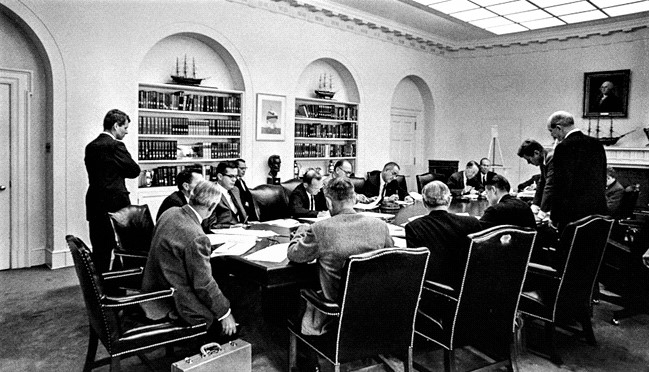“Those who cannot remember the past are condemned to repeat it.” — George Santayana, Spanish philosopher

At the most critical juncture of the Cuban Missile Crisis, President Kennedy was facing the very real possibility of nuclear war with Russia.
In a speech to the American people, Kennedy details the crisis and expresses his desire for full and complete denuclearization. However, the young president also makes clear that “…it is difficult to settle or even discuss these problems in an atmosphere of intimidation. That is why this latest Soviet threat… will be met with whatever action is needed.”
It’s interesting to compare the crisis in Cuba – more than fifty years ago – with the Iranian crisis in which both confrontations took us to the brink of war:
– In response to the failed Bay of Pigs invasion of Cuba – covertly supported and supplied by hardliners in the U.S. – Russia places offensive missiles in Cuba.
– Hardliners in the U.S. kill Iranian Gen. Soleimani, the second most powerful man in Iran, without notification to either Congress or the American public.
– Rather than submit to pressure from hardliners calling for a military response, Kennedy took a more measured approach knowing that escalation could lead to nuclear war. He informs both Congress and the American people before responding to Russia’s actions.
– Citing “imminent” attacks by Iran’s Gen. Soleimani against the U.S., Trump informs the American public via Twitter by showing a photo of an American flag. Five days later, Trump makes a public statement about the action taken. Announcing revenge, Iran launches a missile attack near American forces in Baghdad. The attack does not cause death or injuries. (Later, it was discovered that some American military suffered concussions as a result of the attack.)
– With the unanimous backing of the Organization of American States (OAS), Kennedy imposes a blockade of Cuba, preventing Russian ships from possibly delivering more missiles. At the same time, he publicly announces that Russia will have to remove the missiles.
– Iran utilized three back channels in order to find a peaceful solution before tensions escalated.
– Kennedy utilizes a Russian back channel that had approached a U.S. journalist and begins negotiating a peaceful solution before tensions escalated.
– We don’t know what private negotiations took place inside the Trump administration with Iranian officials to de-escalate the crisis.
– After the Cuban Missile crisis is averted, Russia agrees to remove the missiles. Kennedy publicly announces that “Progress is now being made toward the restoration of peace in the Caribbean, and it is our firm hope and purpose that this progress shall go forward.”
– After the Iranian crisis appears to de-escalate, Trump publicly announces with rhetoric that appears gloating.
“By removing Soleimani, we have sent a powerful message to terrorists: If you value your own life, you will not threaten the lives of our people. … Our great American forces are prepared for anything.”
Trump blames the previous administration supported by false facts.
“The missiles fired last night at us and our allies were paid for with the funds made available by the last administration.”
“Trump… makes it sound as if the United States cut a check to Iran, The Washington Post fact-checker writes… [But] Iran had billions of dollars frozen in foreign banks because of international sanctions over its nuclear program.”
– On November 20, 1962, Kennedy updates the American public. “The evidence to date indicates that all known offensive missile sites in Cuba have been dismantled.”
– On January 9, 2020, at a political rally, Trump justifies his unilateral decision-making in a reference to the House speaker by saying, “We didn’t have time to call up Nancy, who is not operating with a full deck.”
Aftermath –
– At the end of the Cuban missile crisis, the public was unaware of a secret deal which called for the U.S. pulling missiles out of Turkey in exchange for the withdrawal of missiles in Cuba.
– At the end of the Iranian crisis, after a briefing by Trump officials detailing their intelligence, Republican Senator and Trump supporter Mike Lee faced the press saying that it’s “probably the worst briefing I’ve seen…”
Fellow Trump supporter, Sen. Rand Paul was equally disappointed, characterizing the briefing as “ ‘less than satisfying.’ Paul added that the killing of Soleimani was “absurd” and an “insult.”
– After the Cuban Missile Crisis, Kennedy enjoyed a 79 percent approval rating from the public.
– According to a poll by the Pew organization, “64 percent of countries surveyed said they do not have confidence that Mr. Trump will do the ‘right thing’ in world affairs.”
– Sobered by the crisis, both the U.S. and Russian leaders install a direct “hot line” communication link was between Washington and Moscow to help avert future such crisis. Russia and the U.S. sign two treaties related to nuclear weapons.
– The Trump administration has not revealed or discussed the possibility of any long-term solutions to lessen hostilities between the U.S. and Iran.
In a final thought about the crisis, Kennedy addressed the American people.
“In this week of Thanksgiving there is much for which we can be grateful as we look back to where we stood only four weeks ago – the unity of this Hemisphere, the support of our allies, and the calm determination of the American people. These qualities may be tested many more times in this decade, but we have increased reason to be confident that those qualities will continue to serve the cause of freedom with distinction in the years to come.”
Comments










